Leadership and Management for Service Industries: A Hazev Analysis
VerifiedAdded on 2023/02/01
|14
|1592
|33
Presentation
AI Summary
This presentation analyzes leadership and management practices within the service industry, specifically focusing on Hazev Restaurant. It begins by assessing the current hard and soft skills of managers and leaders, differentiating between these skill sets and their impact on organizational success. The presentation then explores future management and leadership skills essential for the service sector, including delegation and emotional intelligence. Furthermore, it compares and contrasts change management styles, examining both Kotter's 8-step model, used by Hazev, Haz & Tas, and the ADKAR model implemented by Marriott hotels. The presentation concludes by highlighting the importance of developing these skills to drive growth and profitability in the service industry, emphasizing the impact of change management on leadership and management styles.
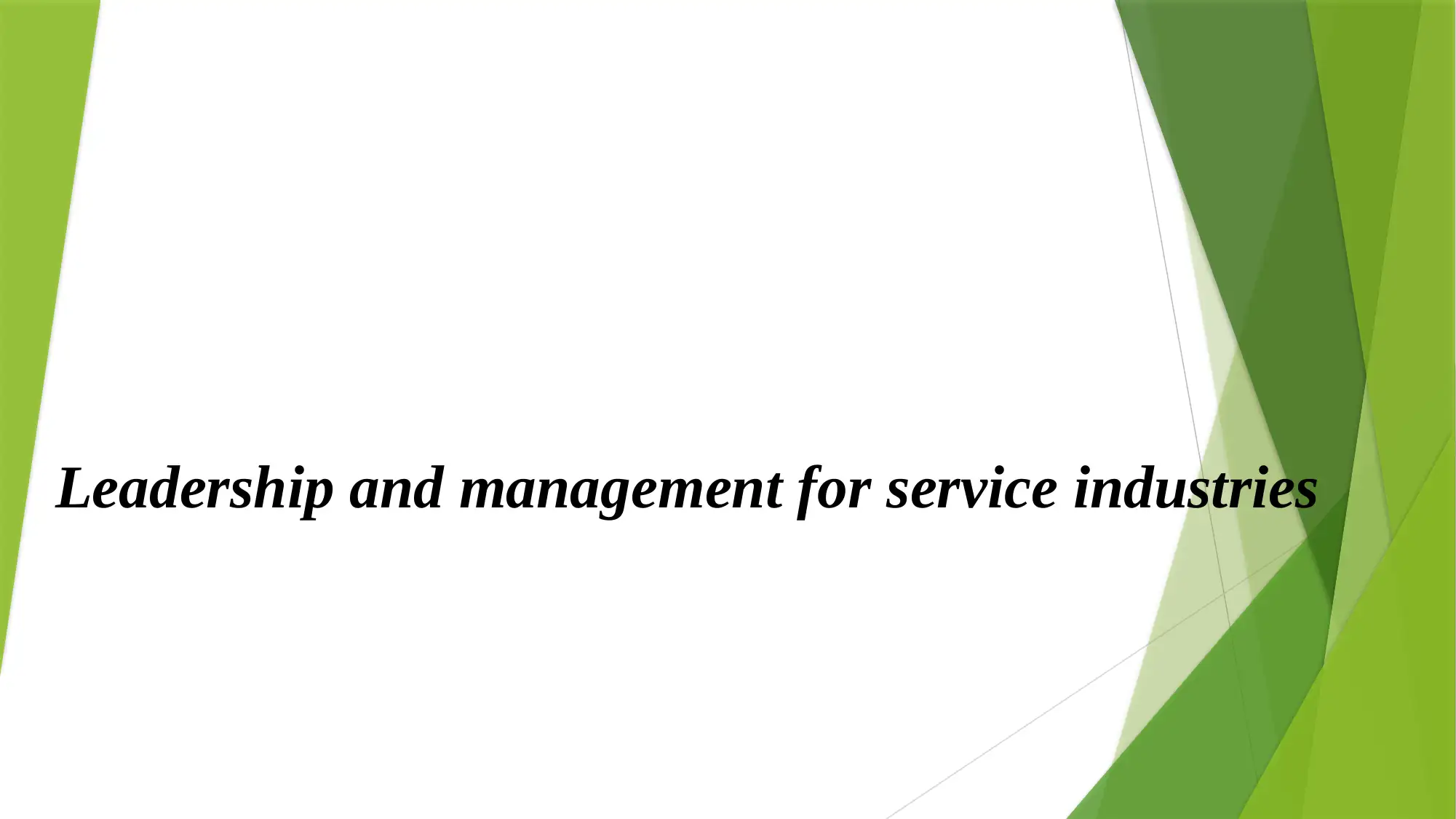
Leadership and management for service industries
Paraphrase This Document
Need a fresh take? Get an instant paraphrase of this document with our AI Paraphraser
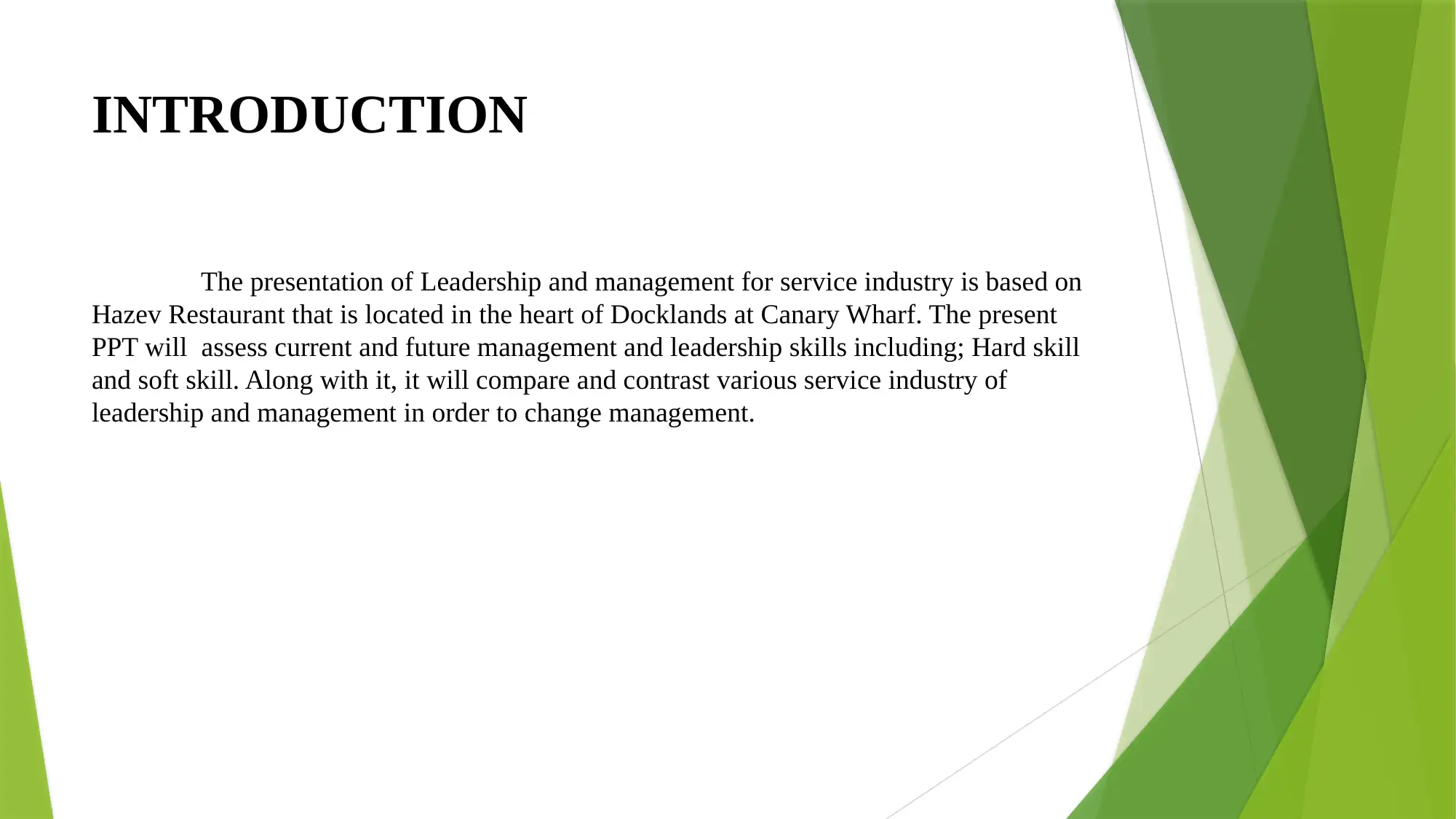
INTRODUCTION
The presentation of Leadership and management for service industry is based on
Hazev Restaurant that is located in the heart of Docklands at Canary Wharf. The present
PPT will assess current and future management and leadership skills including; Hard skill
and soft skill. Along with it, it will compare and contrast various service industry of
leadership and management in order to change management.
The presentation of Leadership and management for service industry is based on
Hazev Restaurant that is located in the heart of Docklands at Canary Wharf. The present
PPT will assess current and future management and leadership skills including; Hard skill
and soft skill. Along with it, it will compare and contrast various service industry of
leadership and management in order to change management.
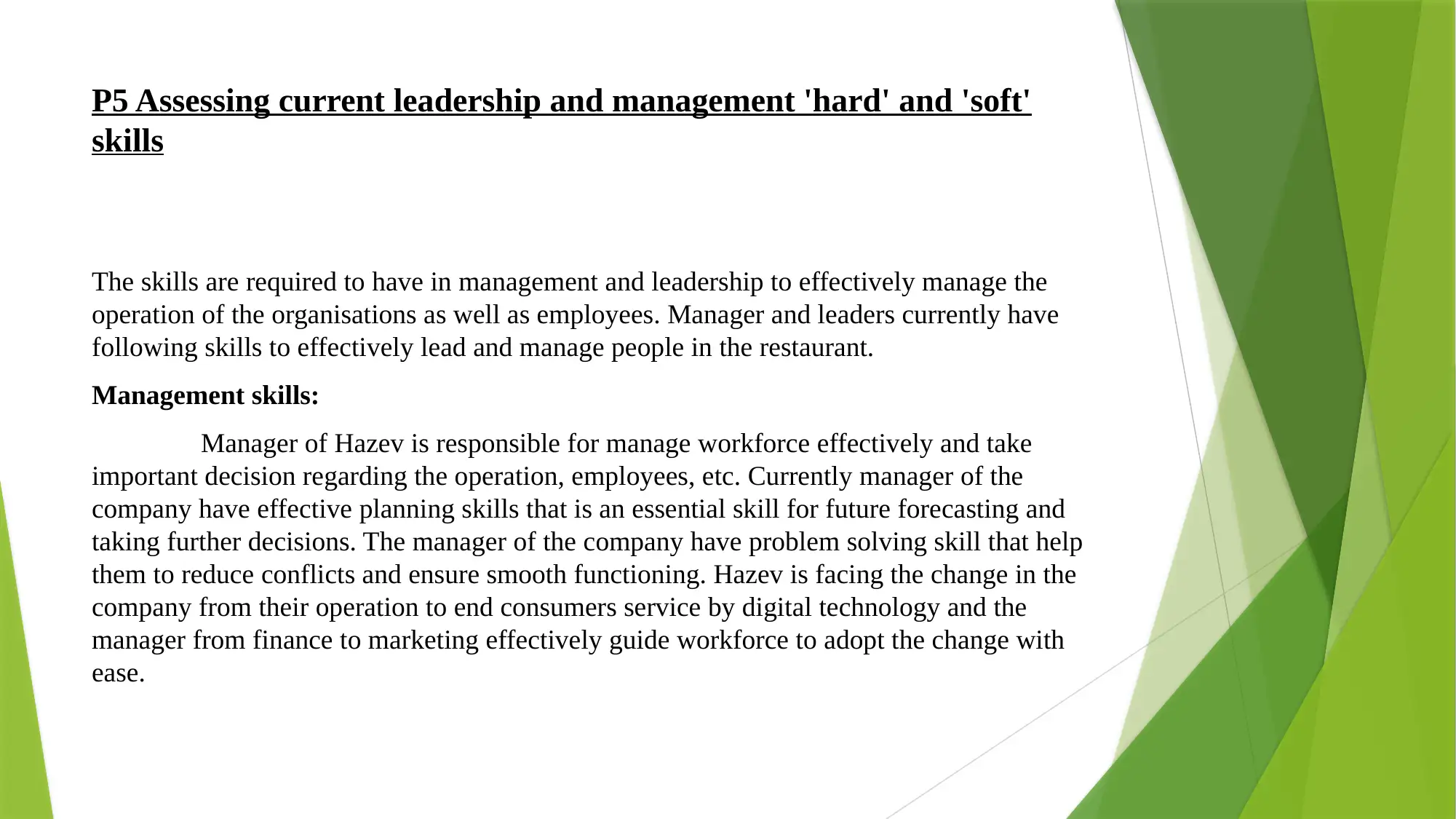
P5 Assessing current leadership and management 'hard' and 'soft'
skills
The skills are required to have in management and leadership to effectively manage the
operation of the organisations as well as employees. Manager and leaders currently have
following skills to effectively lead and manage people in the restaurant.
Management skills:
Manager of Hazev is responsible for manage workforce effectively and take
important decision regarding the operation, employees, etc. Currently manager of the
company have effective planning skills that is an essential skill for future forecasting and
taking further decisions. The manager of the company have problem solving skill that help
them to reduce conflicts and ensure smooth functioning. Hazev is facing the change in the
company from their operation to end consumers service by digital technology and the
manager from finance to marketing effectively guide workforce to adopt the change with
ease.
skills
The skills are required to have in management and leadership to effectively manage the
operation of the organisations as well as employees. Manager and leaders currently have
following skills to effectively lead and manage people in the restaurant.
Management skills:
Manager of Hazev is responsible for manage workforce effectively and take
important decision regarding the operation, employees, etc. Currently manager of the
company have effective planning skills that is an essential skill for future forecasting and
taking further decisions. The manager of the company have problem solving skill that help
them to reduce conflicts and ensure smooth functioning. Hazev is facing the change in the
company from their operation to end consumers service by digital technology and the
manager from finance to marketing effectively guide workforce to adopt the change with
ease.
⊘ This is a preview!⊘
Do you want full access?
Subscribe today to unlock all pages.

Trusted by 1+ million students worldwide
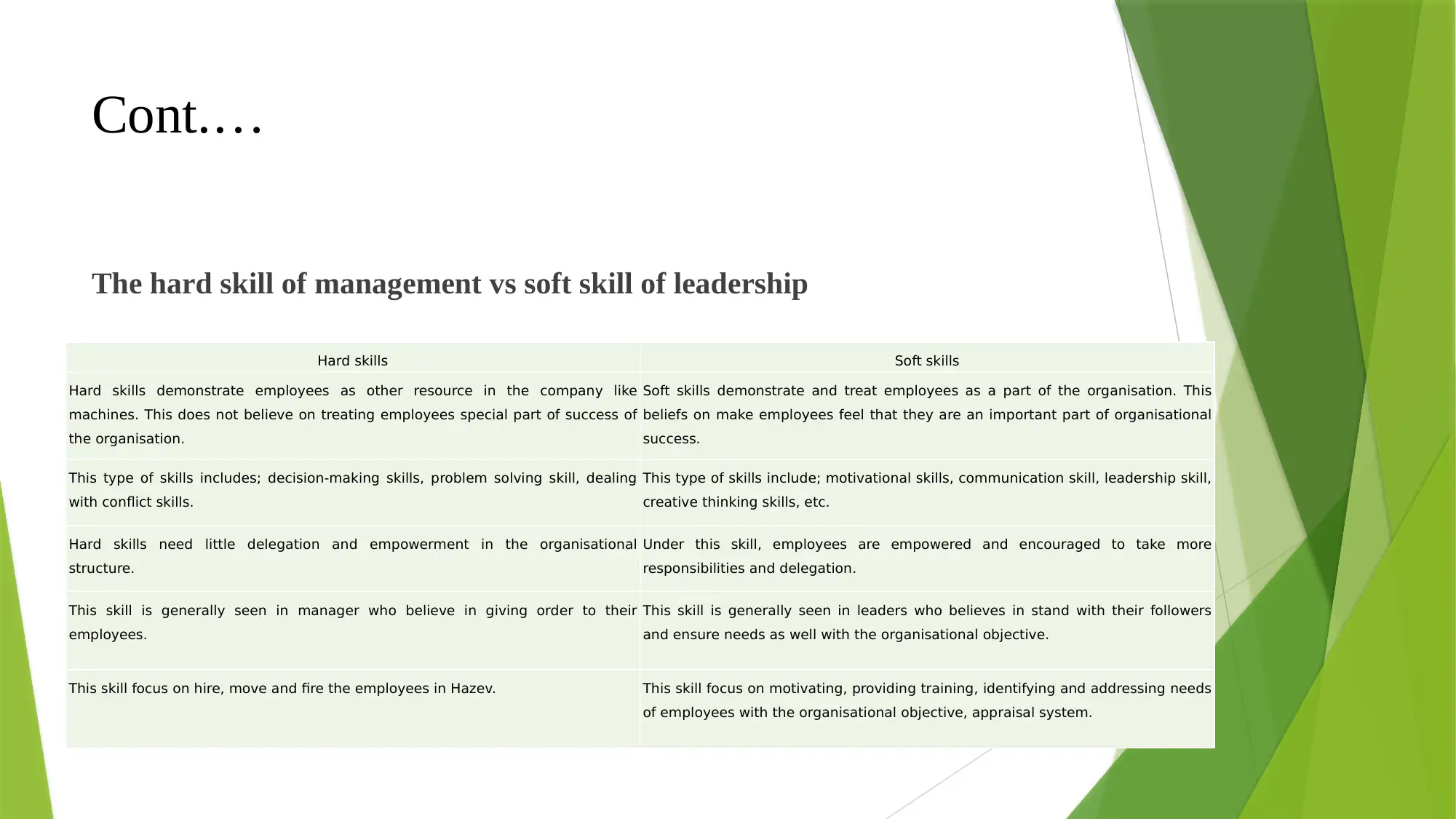
Cont.…
The hard skill of management vs soft skill of leadership
Hard skills Soft skills
Hard skills demonstrate employees as other resource in the company like
machines. This does not believe on treating employees special part of success of
the organisation.
Soft skills demonstrate and treat employees as a part of the organisation. This
beliefs on make employees feel that they are an important part of organisational
success.
This type of skills includes; decision-making skills, problem solving skill, dealing
with conflict skills.
This type of skills include; motivational skills, communication skill, leadership skill,
creative thinking skills, etc.
Hard skills need little delegation and empowerment in the organisational
structure.
Under this skill, employees are empowered and encouraged to take more
responsibilities and delegation.
This skill is generally seen in manager who believe in giving order to their
employees.
This skill is generally seen in leaders who believes in stand with their followers
and ensure needs as well with the organisational objective.
This skill focus on hire, move and fire the employees in Hazev. This skill focus on motivating, providing training, identifying and addressing needs
of employees with the organisational objective, appraisal system.
The hard skill of management vs soft skill of leadership
Hard skills Soft skills
Hard skills demonstrate employees as other resource in the company like
machines. This does not believe on treating employees special part of success of
the organisation.
Soft skills demonstrate and treat employees as a part of the organisation. This
beliefs on make employees feel that they are an important part of organisational
success.
This type of skills includes; decision-making skills, problem solving skill, dealing
with conflict skills.
This type of skills include; motivational skills, communication skill, leadership skill,
creative thinking skills, etc.
Hard skills need little delegation and empowerment in the organisational
structure.
Under this skill, employees are empowered and encouraged to take more
responsibilities and delegation.
This skill is generally seen in manager who believe in giving order to their
employees.
This skill is generally seen in leaders who believes in stand with their followers
and ensure needs as well with the organisational objective.
This skill focus on hire, move and fire the employees in Hazev. This skill focus on motivating, providing training, identifying and addressing needs
of employees with the organisational objective, appraisal system.
Paraphrase This Document
Need a fresh take? Get an instant paraphrase of this document with our AI Paraphraser
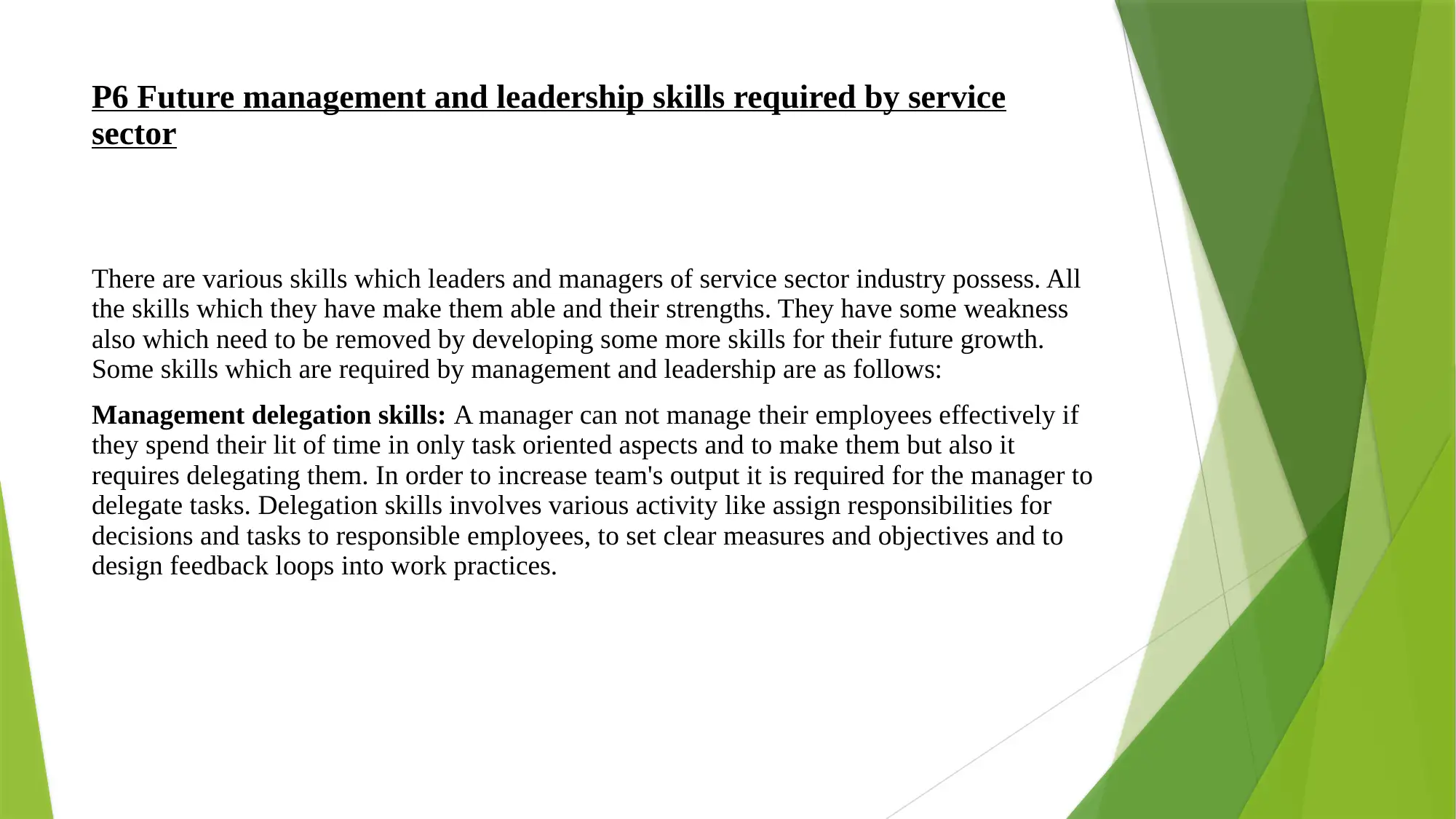
P6 Future management and leadership skills required by service
sector
There are various skills which leaders and managers of service sector industry possess. All
the skills which they have make them able and their strengths. They have some weakness
also which need to be removed by developing some more skills for their future growth.
Some skills which are required by management and leadership are as follows:
Management delegation skills: A manager can not manage their employees effectively if
they spend their lit of time in only task oriented aspects and to make them but also it
requires delegating them. In order to increase team's output it is required for the manager to
delegate tasks. Delegation skills involves various activity like assign responsibilities for
decisions and tasks to responsible employees, to set clear measures and objectives and to
design feedback loops into work practices.
sector
There are various skills which leaders and managers of service sector industry possess. All
the skills which they have make them able and their strengths. They have some weakness
also which need to be removed by developing some more skills for their future growth.
Some skills which are required by management and leadership are as follows:
Management delegation skills: A manager can not manage their employees effectively if
they spend their lit of time in only task oriented aspects and to make them but also it
requires delegating them. In order to increase team's output it is required for the manager to
delegate tasks. Delegation skills involves various activity like assign responsibilities for
decisions and tasks to responsible employees, to set clear measures and objectives and to
design feedback loops into work practices.
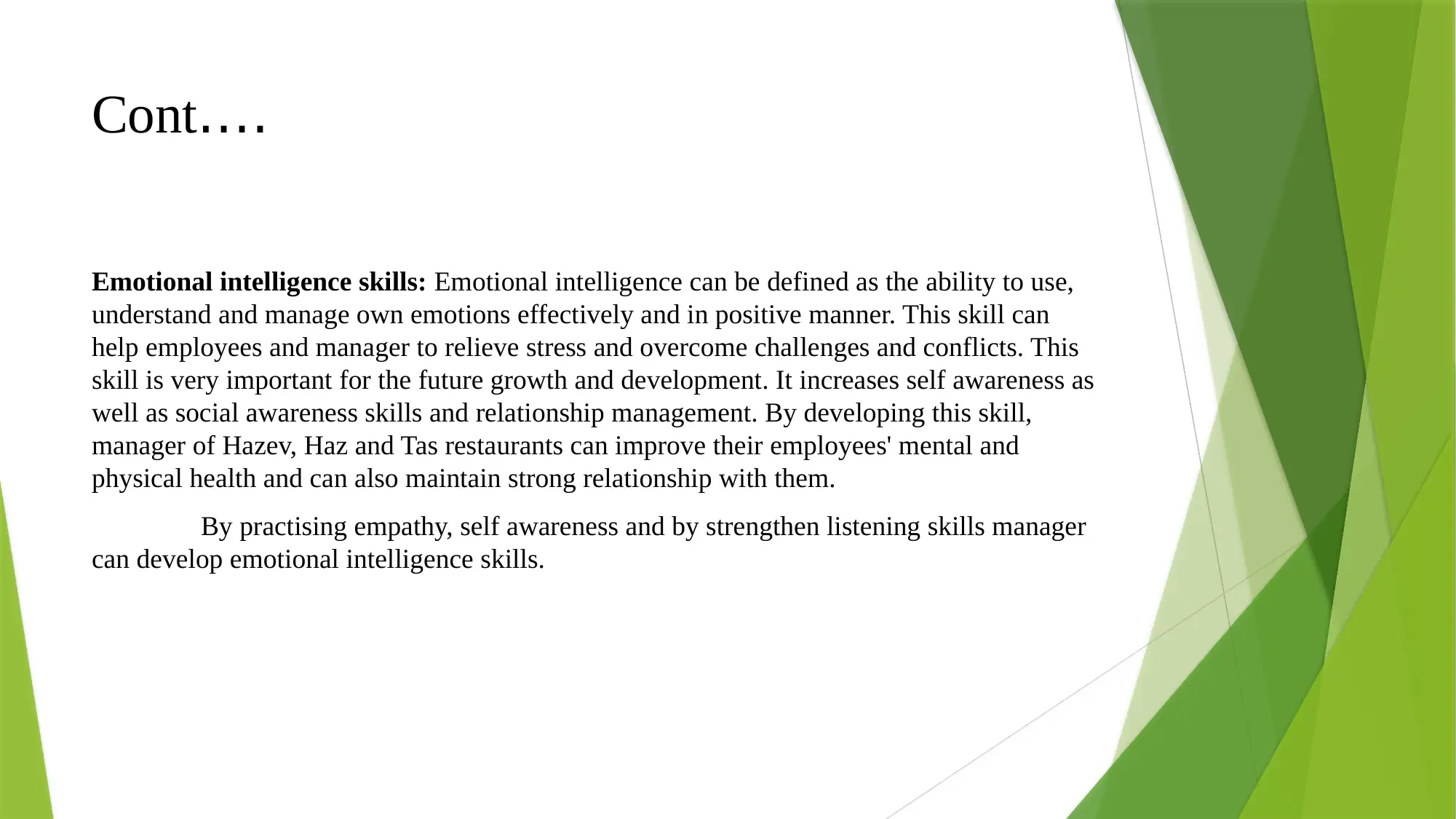
Cont.…
Emotional intelligence skills: Emotional intelligence can be defined as the ability to use,
understand and manage own emotions effectively and in positive manner. This skill can
help employees and manager to relieve stress and overcome challenges and conflicts. This
skill is very important for the future growth and development. It increases self awareness as
well as social awareness skills and relationship management. By developing this skill,
manager of Hazev, Haz and Tas restaurants can improve their employees' mental and
physical health and can also maintain strong relationship with them.
By practising empathy, self awareness and by strengthen listening skills manager
can develop emotional intelligence skills.
Emotional intelligence skills: Emotional intelligence can be defined as the ability to use,
understand and manage own emotions effectively and in positive manner. This skill can
help employees and manager to relieve stress and overcome challenges and conflicts. This
skill is very important for the future growth and development. It increases self awareness as
well as social awareness skills and relationship management. By developing this skill,
manager of Hazev, Haz and Tas restaurants can improve their employees' mental and
physical health and can also maintain strong relationship with them.
By practising empathy, self awareness and by strengthen listening skills manager
can develop emotional intelligence skills.
⊘ This is a preview!⊘
Do you want full access?
Subscribe today to unlock all pages.

Trusted by 1+ million students worldwide
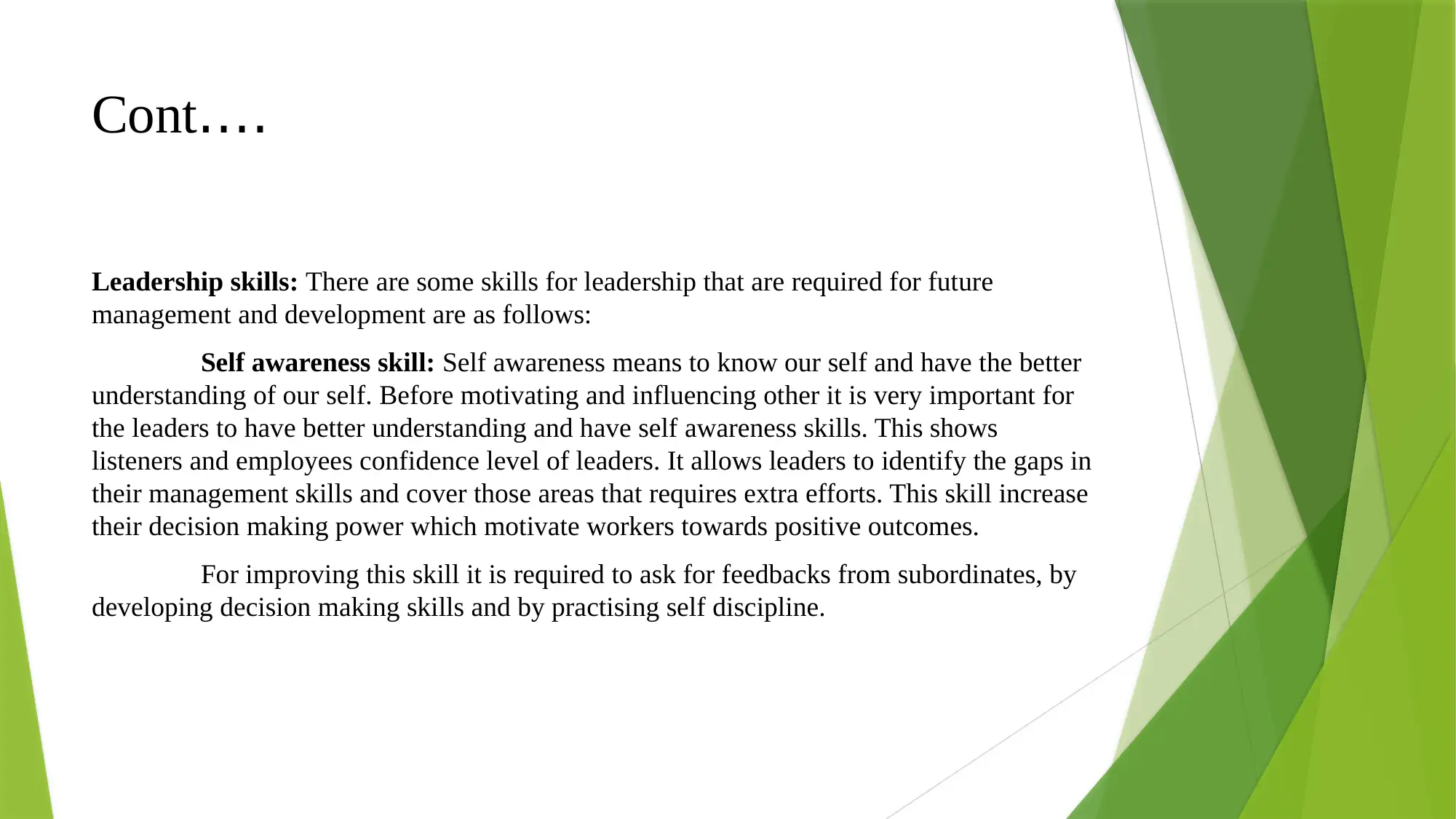
Cont.…
Leadership skills: There are some skills for leadership that are required for future
management and development are as follows:
Self awareness skill: Self awareness means to know our self and have the better
understanding of our self. Before motivating and influencing other it is very important for
the leaders to have better understanding and have self awareness skills. This shows
listeners and employees confidence level of leaders. It allows leaders to identify the gaps in
their management skills and cover those areas that requires extra efforts. This skill increase
their decision making power which motivate workers towards positive outcomes.
For improving this skill it is required to ask for feedbacks from subordinates, by
developing decision making skills and by practising self discipline.
Leadership skills: There are some skills for leadership that are required for future
management and development are as follows:
Self awareness skill: Self awareness means to know our self and have the better
understanding of our self. Before motivating and influencing other it is very important for
the leaders to have better understanding and have self awareness skills. This shows
listeners and employees confidence level of leaders. It allows leaders to identify the gaps in
their management skills and cover those areas that requires extra efforts. This skill increase
their decision making power which motivate workers towards positive outcomes.
For improving this skill it is required to ask for feedbacks from subordinates, by
developing decision making skills and by practising self discipline.
Paraphrase This Document
Need a fresh take? Get an instant paraphrase of this document with our AI Paraphraser
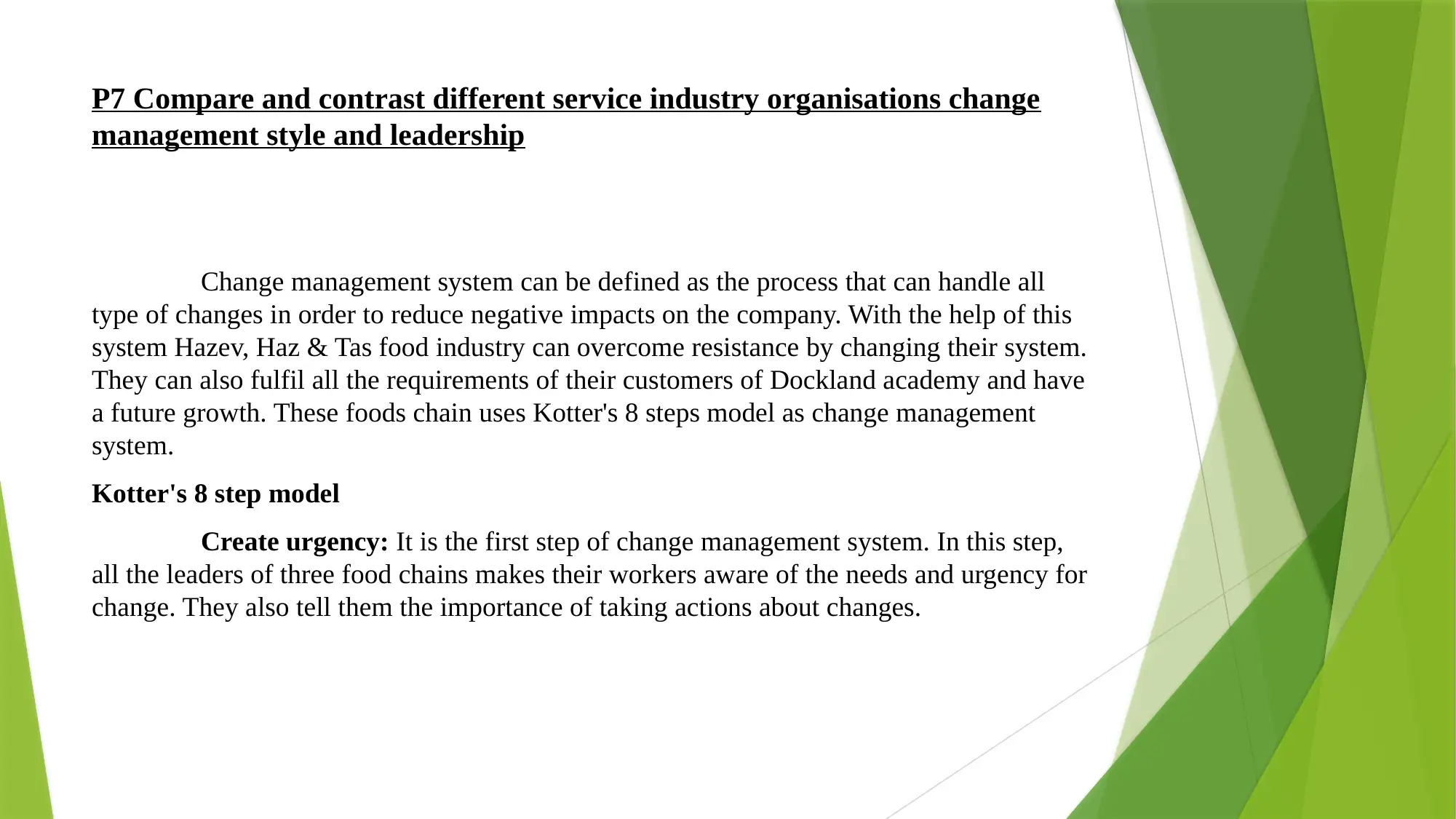
P7 Compare and contrast different service industry organisations change
management style and leadership
Change management system can be defined as the process that can handle all
type of changes in order to reduce negative impacts on the company. With the help of this
system Hazev, Haz & Tas food industry can overcome resistance by changing their system.
They can also fulfil all the requirements of their customers of Dockland academy and have
a future growth. These foods chain uses Kotter's 8 steps model as change management
system.
Kotter's 8 step model
Create urgency: It is the first step of change management system. In this step,
all the leaders of three food chains makes their workers aware of the needs and urgency for
change. They also tell them the importance of taking actions about changes.
management style and leadership
Change management system can be defined as the process that can handle all
type of changes in order to reduce negative impacts on the company. With the help of this
system Hazev, Haz & Tas food industry can overcome resistance by changing their system.
They can also fulfil all the requirements of their customers of Dockland academy and have
a future growth. These foods chain uses Kotter's 8 steps model as change management
system.
Kotter's 8 step model
Create urgency: It is the first step of change management system. In this step,
all the leaders of three food chains makes their workers aware of the needs and urgency for
change. They also tell them the importance of taking actions about changes.
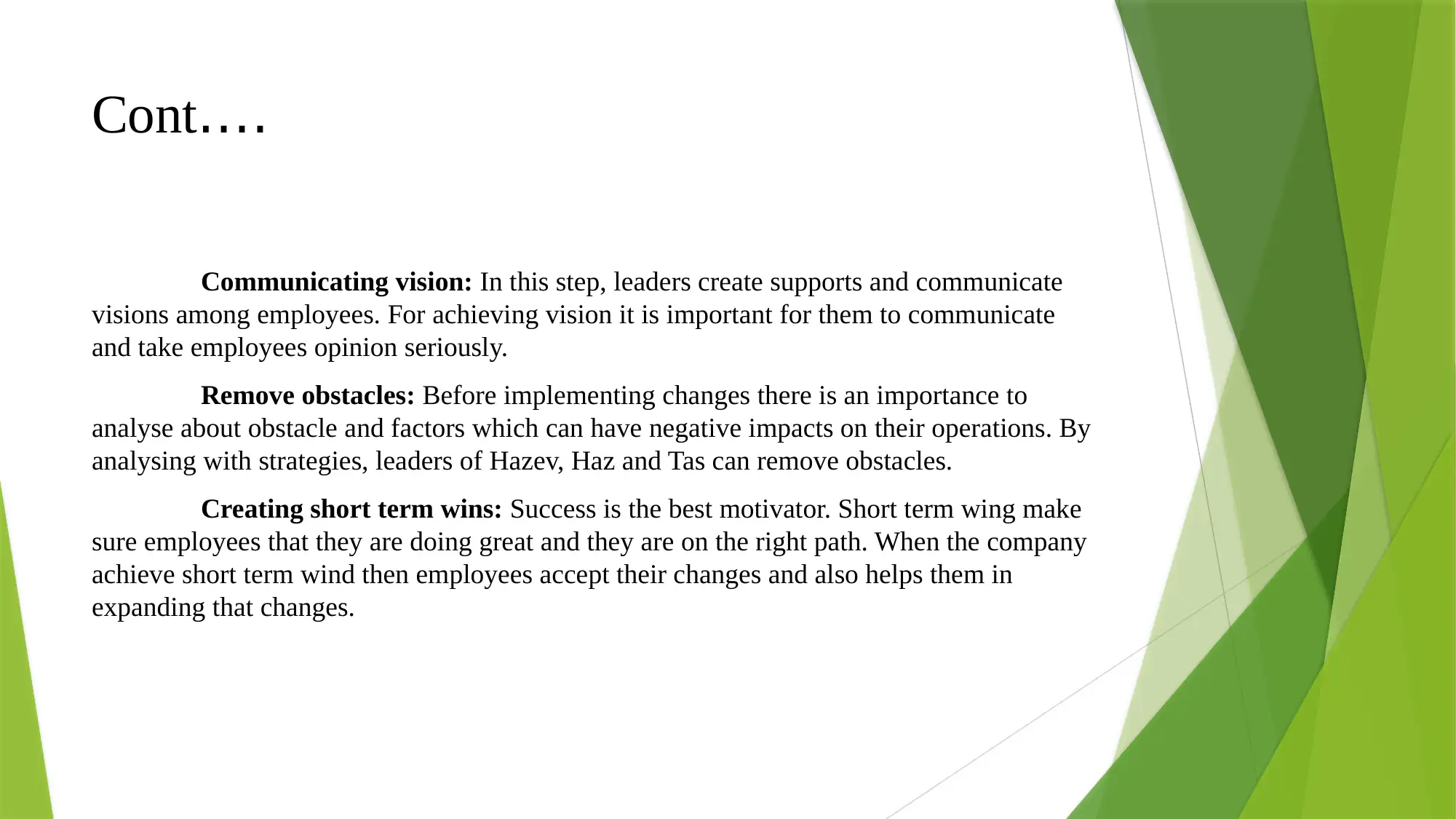
Cont.…
Communicating vision: In this step, leaders create supports and communicate
visions among employees. For achieving vision it is important for them to communicate
and take employees opinion seriously.
Remove obstacles: Before implementing changes there is an importance to
analyse about obstacle and factors which can have negative impacts on their operations. By
analysing with strategies, leaders of Hazev, Haz and Tas can remove obstacles.
Creating short term wins: Success is the best motivator. Short term wing make
sure employees that they are doing great and they are on the right path. When the company
achieve short term wind then employees accept their changes and also helps them in
expanding that changes.
Communicating vision: In this step, leaders create supports and communicate
visions among employees. For achieving vision it is important for them to communicate
and take employees opinion seriously.
Remove obstacles: Before implementing changes there is an importance to
analyse about obstacle and factors which can have negative impacts on their operations. By
analysing with strategies, leaders of Hazev, Haz and Tas can remove obstacles.
Creating short term wins: Success is the best motivator. Short term wing make
sure employees that they are doing great and they are on the right path. When the company
achieve short term wind then employees accept their changes and also helps them in
expanding that changes.
⊘ This is a preview!⊘
Do you want full access?
Subscribe today to unlock all pages.

Trusted by 1+ million students worldwide
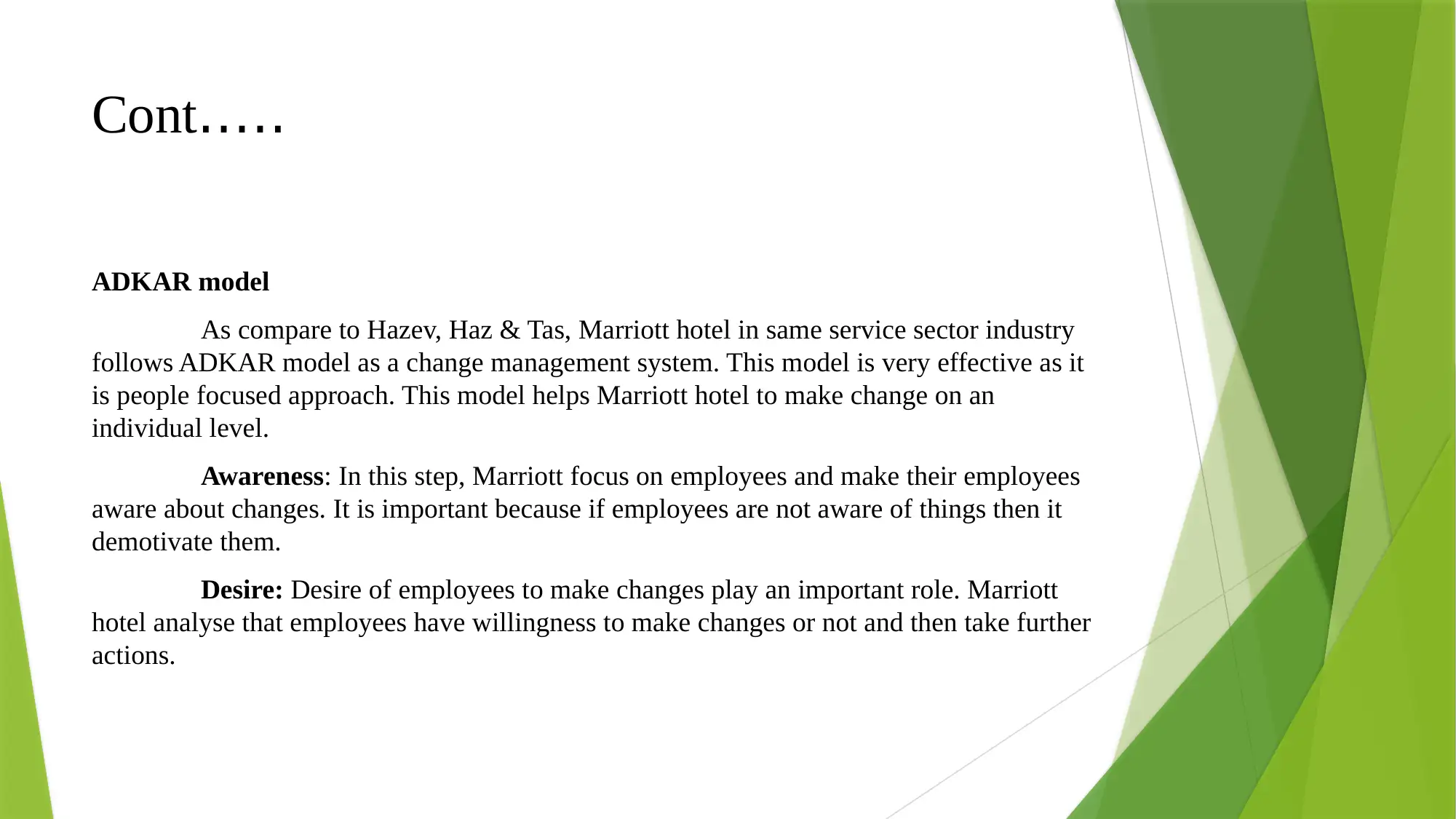
Cont.….
ADKAR model
As compare to Hazev, Haz & Tas, Marriott hotel in same service sector industry
follows ADKAR model as a change management system. This model is very effective as it
is people focused approach. This model helps Marriott hotel to make change on an
individual level.
Awareness: In this step, Marriott focus on employees and make their employees
aware about changes. It is important because if employees are not aware of things then it
demotivate them.
Desire: Desire of employees to make changes play an important role. Marriott
hotel analyse that employees have willingness to make changes or not and then take further
actions.
ADKAR model
As compare to Hazev, Haz & Tas, Marriott hotel in same service sector industry
follows ADKAR model as a change management system. This model is very effective as it
is people focused approach. This model helps Marriott hotel to make change on an
individual level.
Awareness: In this step, Marriott focus on employees and make their employees
aware about changes. It is important because if employees are not aware of things then it
demotivate them.
Desire: Desire of employees to make changes play an important role. Marriott
hotel analyse that employees have willingness to make changes or not and then take further
actions.
Paraphrase This Document
Need a fresh take? Get an instant paraphrase of this document with our AI Paraphraser
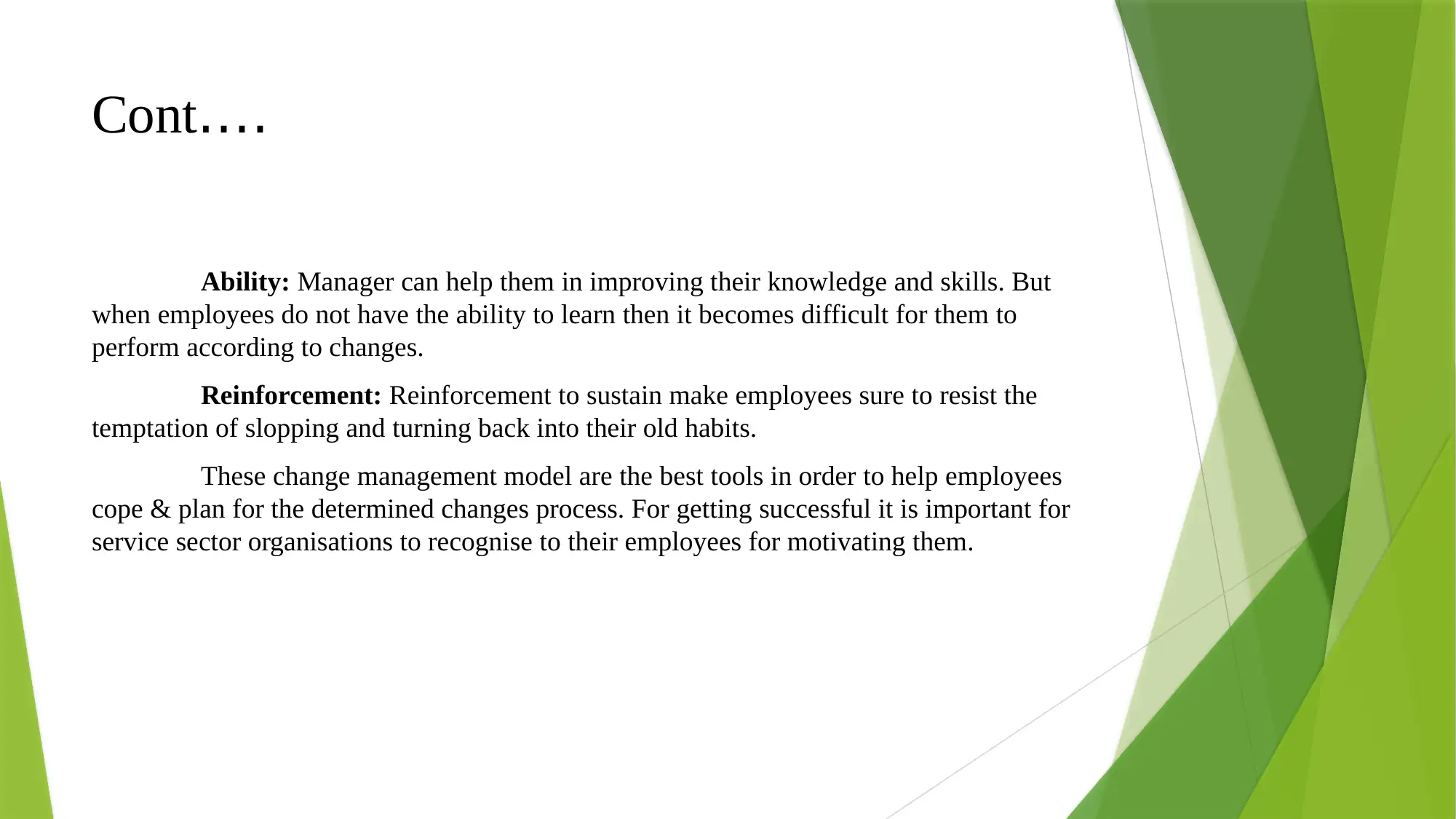
Cont.…
Ability: Manager can help them in improving their knowledge and skills. But
when employees do not have the ability to learn then it becomes difficult for them to
perform according to changes.
Reinforcement: Reinforcement to sustain make employees sure to resist the
temptation of slopping and turning back into their old habits.
These change management model are the best tools in order to help employees
cope & plan for the determined changes process. For getting successful it is important for
service sector organisations to recognise to their employees for motivating them.
Ability: Manager can help them in improving their knowledge and skills. But
when employees do not have the ability to learn then it becomes difficult for them to
perform according to changes.
Reinforcement: Reinforcement to sustain make employees sure to resist the
temptation of slopping and turning back into their old habits.
These change management model are the best tools in order to help employees
cope & plan for the determined changes process. For getting successful it is important for
service sector organisations to recognise to their employees for motivating them.
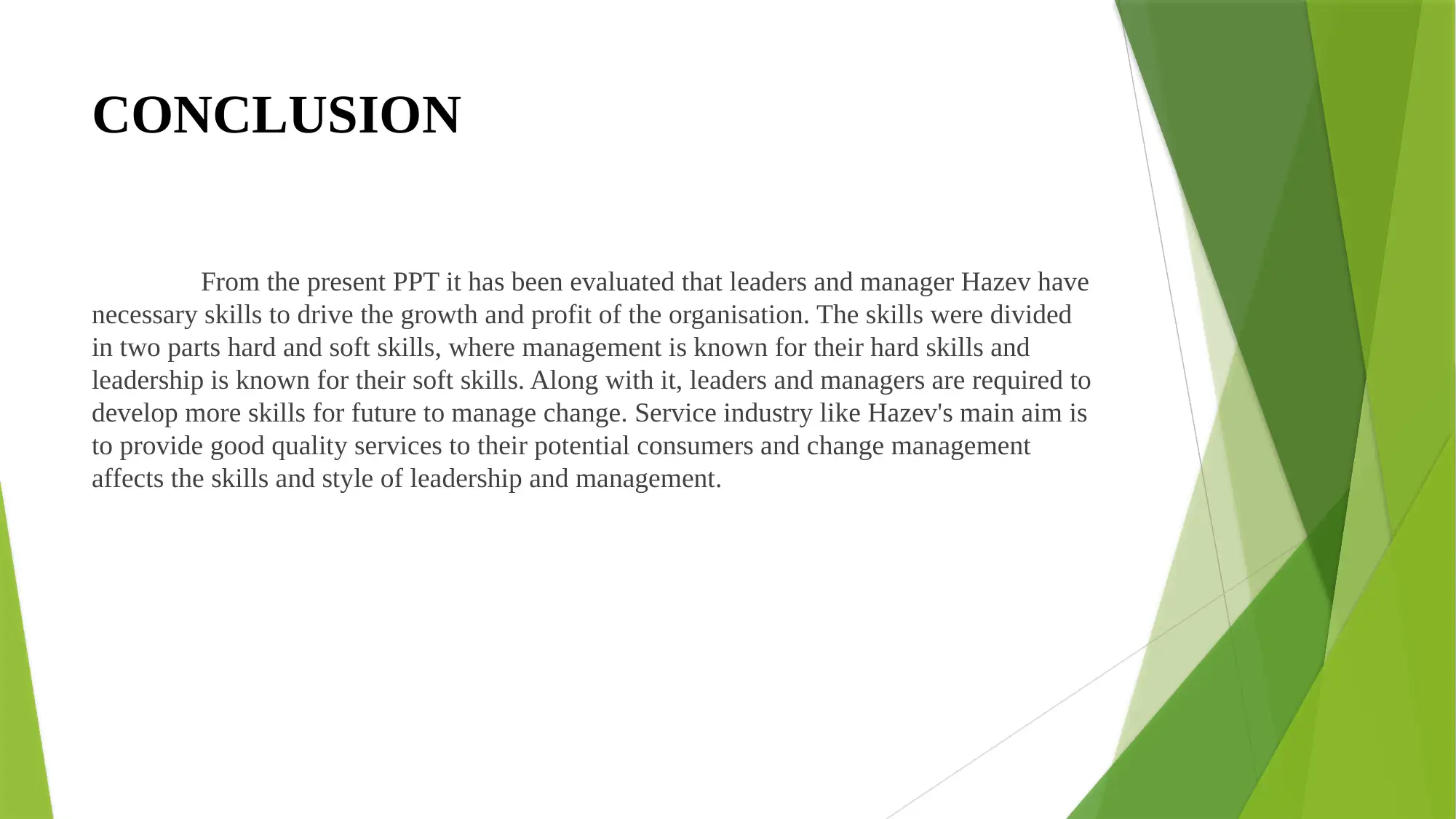
CONCLUSION
From the present PPT it has been evaluated that leaders and manager Hazev have
necessary skills to drive the growth and profit of the organisation. The skills were divided
in two parts hard and soft skills, where management is known for their hard skills and
leadership is known for their soft skills. Along with it, leaders and managers are required to
develop more skills for future to manage change. Service industry like Hazev's main aim is
to provide good quality services to their potential consumers and change management
affects the skills and style of leadership and management.
From the present PPT it has been evaluated that leaders and manager Hazev have
necessary skills to drive the growth and profit of the organisation. The skills were divided
in two parts hard and soft skills, where management is known for their hard skills and
leadership is known for their soft skills. Along with it, leaders and managers are required to
develop more skills for future to manage change. Service industry like Hazev's main aim is
to provide good quality services to their potential consumers and change management
affects the skills and style of leadership and management.
⊘ This is a preview!⊘
Do you want full access?
Subscribe today to unlock all pages.

Trusted by 1+ million students worldwide
1 out of 14
Related Documents
Your All-in-One AI-Powered Toolkit for Academic Success.
+13062052269
info@desklib.com
Available 24*7 on WhatsApp / Email
![[object Object]](/_next/static/media/star-bottom.7253800d.svg)
Unlock your academic potential
Copyright © 2020–2026 A2Z Services. All Rights Reserved. Developed and managed by ZUCOL.





